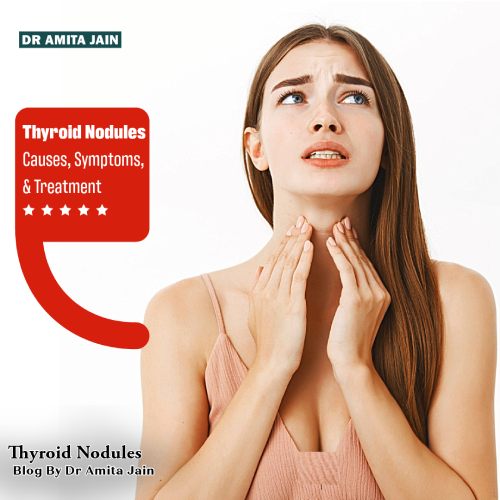Thyroid nodules are growths or lumps that form within the thyroid gland, located at the base of the neck. While thyroid nodules are common and often benign, they can sometimes indicate underlying health issues. Understanding the causes, symptoms, and treatment options is crucial for managing thyroid nodules effectively as explained by Dr Amita Jain, who is a leading thyroid surgeon in the field of laparoscopic surgery in India.
What are the Causes of Thyroid Nodules?
Thyroid nodules can arise from various factors, and their exact cause is not always clear. Common causes include:
- Iodine Deficiency: In regions where there is a lack of iodine in the diet, thyroid nodules may develop. Iodine is essential for the production of thyroid hormones.
- Thyroiditis: Inflammation of the thyroid, known as thyroiditis, can lead to the formation of nodules. This inflammation may be due to autoimmune disorders or infections.
- Genetic Factors: Some individuals may be genetically predisposed to developing thyroid nodules.
- Multinodular Goiter: An enlarged thyroid gland, known as a goiter, can result in the formation of nodules.
- Radiation Exposure: Previous exposure to radiation, especially during childhood, increases the risk of thyroid nodules.
What are the Symptoms of Thyroid Nodules?
Thyroid nodules often do not cause noticeable symptoms, and many are discovered incidentally during routine medical examinations or imaging tests. However, when symptoms do occur, they may include:
- Swelling or Lump in the Neck: A visible or palpable lump in the neck is a common symptom of thyroid nodules.
- Difficulty Swallowing: Larger nodules may cause difficulty in swallowing or a feeling of throat constriction.
- Voice Changes: Nodules pressing on the vocal cords can lead to hoarseness or changes in voice.
- Pain or Discomfort: Some individuals may experience pain or discomfort in the neck area.
- Thyroid Dysfunction: In some cases, thyroid nodules can affect hormone production, leading to symptoms of hyperthyroidism (excessive thyroid hormone) or hypothyroidism (insufficient thyroid hormone).
What are the Treatment Options for Thyroid Nodules?
The approach to treating thyroid nodules depends on their size, symptoms, and whether they are cancerous or benign. Common treatment options include:
- Observation: Small, non-cancerous nodules may be monitored without immediate intervention, especially if they are not causing symptoms.
- Medication: Thyroid hormone replacement therapy may be prescribed to regulate hormone levels and shrink nodules.
- Radioactive Iodine Therapy: In cases of hyperthyroidism or nodules producing excess hormones, radioactive iodine may be used to reduce nodule size and activity.
- Thyroid Surgery (Thyroidectomy): Surgical removal of the thyroid gland or the affected nodule may be recommended, particularly if the nodule is causing breathing difficulties, is suspicious for cancer, or if other treatments are ineffective.
- Fine Needle Aspiration (FNA) Biopsy: If a nodule is suspicious, a biopsy may be performed to determine if it is cancerous. This involves extracting a small sample of tissue for examination.
Thyroid nodules are a common thyroid disorder that, in most cases, do not cause significant health issues. Regular monitoring, proper diagnosis, and appropriate treatment are essential to manage thyroid nodules effectively. If individuals notice any symptoms or have concerns about their thyroid health, consulting with a healthcare professional is crucial for accurate diagnosis and personalized treatment plans. Early detection and intervention can contribute to successful management and improved overall thyroid health.

Dr Amita Jain is one of India’s most distinguished and experienced senior surgeons who has conducted more than 1,00,000 successful surgeries, and has covered a wide spectrum of general and minimally invasive procedures. Dr Amita Jain is refered as the pioneer surgeon in the fields of Gallbladder stone removal surgery, appendix removal surgery, hernia repair surgery, Pilonidal Sinus treatments, varicose vein and piles surgery, fistula surgery and fissure surgeries.
With an outstanding career spanning over 29 years, Dr Amita Jain has earned her place among the top General and Laparoscopic surgeons in Delhi and India, known for her precision, compassion, and consistent surgical excellence. She was the Professor of Surgery at the Army College of Medical Sciences and Base Hospital, Delhi Cantt. In 1994, she was commissioned as a surgeon under the United Nations Mission in Congo.
Dr Amita Jain currently serves as the Head of Department and Senior Consultant for General, Laparoscopic and Trauma Surgery at Artemis Lite Hospital, Rosewalk – Luxury Maternity Hospital in Delhi (Panchsheel Park, Delhi) and Rainbow Children Hospitals (Malviya Nagar, Delhi).
